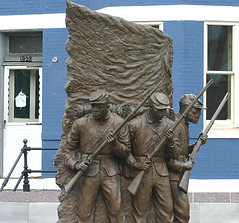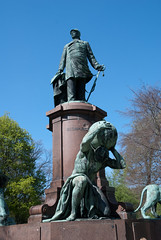Ch.23 AP World History Flashcards
The Dawn of the Industrial Age 1750-1914
Terms : Hide Images [1]
| 3422129705 | Captain James Cook | Made voyages to Hawaii from 1777-1779 resulting in openings of islands to the West; convinced Kamehamehah to establish a unified kingdon in the islands |  | 0 |
| 3422129712 | Berlin Conference | Conference that German chancellor Otto von Bismarck called to set rules for the partition of Africa. It led to the creation of the Congo Free State under King Leopold II of Belgium. | 1 | |
| 3422129748 | Louis Pasteur | French chemist and biologist whose discovery that fermentation is caused by microorganisms resulted in the process of pasteurization (1822-1895) |  | 2 |
| 3422129749 | Louis XVI | King of France (1774-1792). In 1789 he summoned the Estates-General, but he did not grant the reforms that were demanded and revolution followed. Louis and his queen, Marie Antoinette, were executed in 1793. |  | 3 |
| 3422129751 | Maximilien Robespierre | He was a lawyer and a member of the National Convention. Led the Mountain side of the National Convention(Montagarde). and Chairman on the Committe of Public Safety. Helped France's financial situation through the concept of planned economy (setting price limits on certain products). Was a very large part of the radicalization of France, but efforts eventually led to the fall of France and take-over by Napoleon Bonaparte. He claimed that the Revolution was over. In a sense he was right; the last reforms were made in 1791. The people strongly disliked him for his views on the disablement of speaking against the republic. He was one of the main contributors to the laws that stated the death penalty for those who went against the revolution. |  | 4 |
| 3422129752 | Declaration of the Rights of man and the Citizen | One of the fundamental documents of the French Revolution, defining a set of individual rights and collective rights of all of the estates as one. Influenced by the doctrine of natural rights, these rights are universal: they are supposed to be valid in all times and places, pertaining to human nature itself. |  | 5 |
| 3422129753 | Guillotine | Introduced as a method of humane execution; utilized to execute thousands during the most radical phase of the French Revolution known as the Reign of Terror. |  | 6 |
| 3422129754 | French Revolution | The second great democratic revolution, taking place in the 1790s, after the American Revolution had been proven to be a success. The U.S. did nothing to aid either side. The French people overthrew the king and his government, and then instituted a series of unsuccessful democratic governments until Napoleon took over as dictator in 1799. |  | 7 |
| 3422129757 | Age of Revolution | Period of politcal upheaval beginning roughly with the American Revolution in 1775 and continuing through the French Revolution of 1789 and other movements for change up to 1848 | 8 | |
| 3422129758 | Bastille | The political prison and armory stormed on July 14, 1789, by Partisian city workers alarmed by the king's concentration of troops at Versailles |  | 9 |
| 3422129760 | Rousseau | French philosopher and writer born in Switzerland, believed people in their natural state were basically good but that they were corrupted by the evils of society, especially the uneven distribution of property | 10 | |
| 3422129761 | Nationalism | Political viewpoint with origins in Western Europe; often allied with other "isms"; urged importance of national unity; valued a collective identity based on culture, race, or ethnic origin. |  | 11 |
| 3422129762 | James Watt | Scot who invented the condenser and other improvements that made the steam engine a practical source of power for industry and transportation. The watt, an electrical measurement, is named after him. | 12 | |
| 3422129763 | Population Revolution | Huge growth in population in Western Europe beginning about 1730; prelude to Industrial Revolution; population of France increased 50 percent, England and Prussia 100 percent. | 13 | |
| 3422129764 | Proto-Industrialization | Preliminary shift away from agricultural economy in Europe; workers become full- or part-time producers of textile and metal products, working at home but in a capitalist system in which materials, work orders, and ultimate sales depended on urban merchants; prelude to Industrial Revolution. | 14 | |
| 3422129766 | Reign of Terror | Period in the French Revolution. It was established by the government on Sept. 5, 1793, to take harsh measures against those suspected of being enemies of the Revolution (including nobles, priests, and hoarders). Controlled by the radical Committee of Public Safety and Maximilien Robespierre, the Terror eliminated enemies on the left (Jacques Hébert and his followers) and the right (Georges Danton and the Indulgents). |  | 15 |
| 3422129767 | Committee of Public Safety | The leaders under Robespierre who organized the defenses of France, conducted foreign policy, and centralized authority during the period 1792-1795.Basically secret police and also controlled the war effort. Instigated the Reign of Terror. | 16 | |
| 3422129768 | Marie Antoinette | Queen of France (as wife of Louis XVI) who was unpopular her extravagance and opposition to reform contributed to the overthrow of the monarchy; she was guillotined along with her husband (1755-1793) |  | 17 |
| 3422129769 | Estates General | France's traditional national assembly with representatives of the three estates, or classes, in French society: the clergy, nobility, and commoners. The calling of the Estates General in 1789 led to the French Revolution. | 18 | |
| 3422129770 | Napoleon Bonaparte | Overthrew French Directory in 1799 and became emperor of the French in 1804. Failed to defeat Great Britain and abdicated in 1814. Returned to power briefly in 1815 but was defeated and died in exile. | 19 | |
| 3422129771 | Congress of Vienna | The Quadruple Alliance met, to discuss the Balance of Power. Great Britian got to have their conquered colonies, Austria got Venetia and Lombardy and Polis lands, and Prussia and Russia were compensated. | 20 | |
| 3422129773 | Quadruple Alliance | G.B., Austria, Prussia, and Russia united to defeat France and their Bonapartism, and also to ensure peace after war. After Napoleon, they resotred the Bourbon monarchy to France. | 21 | |
| 3422129777 | American Civil War | Fought from 1861 to 1865; first application of Industrial Revolution to warfare; resulted in abolition of slavery in the United States and reunification of North and South. |  | 22 |
| 3422129778 | Conservatives | Political viewpoint with origins in western Europe during the 19th Century; opposed revolutionary goals; advanced restoration of monarchy and defense of Church | 23 | |
| 3422129779 | Liberal | Political viewpoint with origins in Western Europe during the 19th century; stressed limited state interference in individual life, representation of propertied people in government; urged importance of constitutional rule and parliaments. | 24 | |
| 3422129780 | Radical | Political viewpoint with origins in western Europe during the 19th century; advocated broader voting rights than liberals; in some cases advocated outright democracy; urged reforms in favor of the lower classes | 25 | |
| 3422129781 | Greek Revolution | Rebellion in Greece against the Ottoman Empire in 1820; key step in gradually dismantling the Ottoman Empire in the Balkans. |  | 26 |
| 3422129782 | French Revolution of 1830 | Second revolution against the Bourbon dynasty; a liberal movement that created a bourgeois government under a moderate monarchy. | 27 | |
| 3422129784 | Reform Bill of 1832 | Legislation passed in Great Britain that extended the vote to most members of the middle class; failed to produce democracy in Britain. | 28 | |
| 3422129785 | Charist Movement | Attempt to by artisans and workers in Britain to gain the vote during 1840s; demands for reform beyond the reform bill of 1832 were incorporated into a series of petitions; movement failed | 29 | |
| 3422129786 | French Revolution of 1848 | Overthrew the monarchy established in 1830; briefly established a democratic republic; failure of the republic led to the reestablishment of the French Empire under Napoleon III in 1850. | 30 | |
| 3422129789 | Otto Von Bismarck | Chancellor of Prussia from 1862 until 1871, when he became chancellor of Germany. A conservative nationalist, he led Prussia to victory against Austria (1866) and France (1870) and was responsible for the creation of the German Empire |  | 31 |
| 3422129790 | Trasformismo | Political system in late 19th-century Italy that promoted alliance of conservatives and liberals; parliamentary deputies of all parties supported the status quo. | 32 | |
| 3422129791 | Social Question | Issues relating to workers and women in western Europe during the Industrial Revolution; became more critical than constitutional issues after 1870. | 33 | |
| 3422129792 | Socialism | Political movement with origins in Western Europe during the 19th century; urged an attack on private property in the name of equality; wanted state control of means of production, end to capitalist exploitation of the working man. |  | 34 |
| 3422129793 | Karl Marx | German socialist of the mid-19th century; blasted earlier socialist movements as utopian; saw history as defined by class struggle between groups out of power and those controlling the means of production; preached necessity of social revolution to create proletarian dictatorship. |  | 35 |
| 3422129794 | Revisionism | Socialist movements that at least tacitly disavowed Marxist revolutionary doctrine; believed social success could be achieved gradually through political institutions. | 36 | |
| 3422129795 | Feminist Movements | Sought various legal and economic gains for women, including equal access to professions and higher education; came to concentrate on right to vote; won support particularly from middle-class women; active in Western Europe at the end of the 19th century; revived in light of other issues in the 1960s. | 37 | |
| 3422129796 | Emmeline Pankhurst | British suffrage leader. Led movement to win the vote for women in Great Britain. Founded the Women Social and Political Union in 1903, which held public meetings and led protest marches to the House of Commons. Jailed several times between 1908 and 1913, and used hunger strikes to protest. World War I compelled her to stop her feminist campaigns and join the war effort. |  | 38 |
| 3422129799 | The Communist Manifesto | Written by Marx and Engels; said that human societies have always been in warring class; put the middle class as "haves" and the working class as "have-nots"; said that IR had enriched the wealthy and impoverished the poor, predicting that the workers would overthrow the owners; inspired revolutionaries to adapt Marx's beliefs to their own situations |  | 39 |
| 3422129800 | Mass Leisure Culture | An aspect of the later Industrial Revolution; based on newspapers, music halls, popular theater, vacation trips, and team sports. | 40 | |
| 3422129801 | Charles Darwin | English naturalist. He studied the plants and animals of South America and the Pacific islands, and in his book On the Origin of Species by Means of Natural Selection (1859) set forth his theory of evolution.- |  | 41 |
| 3422129802 | On the Origin of the Species | Darwin wrote this book in 1859 in which he presented his theory of evolution in the principle of natural selection. The basic idea of this book was that all plants and animals had evolved over a long period of time from earlier and simpler forms of life. In this book, Darwin also presented the theory of natural selection and "survival of the fit." In this book, Darwin discussed plant and animal species only. He was not concerned with humans themselves. |  | 42 |
| 3422129803 | Albert Einstein | 1879-1955. German born theoretical physicist. Best known for his theory of relativity and his theory of energy equivalence. Received Nobel Prize in 1921 for physics. | 43 | |
| 3422129804 | Sigmund Freud | Leading psychologist of the twentieth century. Assumed that a single, unified conscious mind processed sense experiences in a rational and logical way. Analyzed dreams and hysteria. Believed that rational thinking and traditional moral values will repress sexual desires too effectively, causing guilt and neurotic fears. | 44 | |
| 3422129806 | Romanticism | Artistic and literary movement of the 19th century in Europe; held that emotion and impression, not reason, were the keys to the mysteries of human experience and nature; sought to portray passions, not calm reflection. |  | 45 |
| 3422129807 | Urbanization | An increase in the percentage and in the number of people living in urban settlements. | 46 | |
| 3422129808 | Monroe Doctrine | A statement of foreign policy which proclaimed that Europe should not interfere in affairs within the United States or in the development of other countries in the Western Hemisphere. | 47 | |
| 3422129810 | Triple Alliance | Alliance among Germany, Austria-Hungary, and Italy | 48 | |
| 3422129811 | Triple Entente | A military alliance between Great Britain, France, and Russia | 49 | |
| 3422129812 | Balkan Nationalism | Movements to create independent nations within the Balkan possessions of the Ottoman Empire; provoked a series of crises within the European alliance system; eventually led to World War I. | 50 | |
| 3422218680 | 1789-1799 | French revolution | 51 | |
| 3422276941 | 1799-1815 | Napoleon | 52 | |
| 3422282671 | 1815 | congress of Vienna | 53 | |
| 3422348726 | Grain and meats | US exports | 54 | |
| 3422382712 | Balkan nationalism | Caused WWI | 55 | |
| 3422411604 | 56 |
